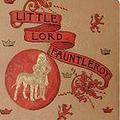Chapter 4 (4)
"The money!" Mr. Havisham exclaimed. "You can not mean the income he proposed to settle upon you!" "Yes," she answered, quite simply; "I think I should rather not have it. I am obliged to accept the house, and I thank him for it, because it makes it possible for me to be near my child; but I have a little money of my own,--enough to live simply upon,--and I should rather not take the other. As he dislikes me so much, I should feel a little as if I were selling Cedric to him. I am giving him up only because I love him enough to forget myself for his good, and because his father would wish it to be so." Mr. Havisham rubbed his chin.
"This is very strange," he said. "He will be very angry. He won't understand it." "I think he will understand it after he thinks it over," she said. "I do not really need the money, and why should I accept luxuries from the man who hates me so much that he takes my little boy from me--his son's child?" Mr. Havisham looked reflective for a few moments.
"I will deliver your message," he said afterward. And then the dinner was brought in and they sat down together, the big cat taking a seat on a chair near Cedric's and purring majestically throughout the meal. When, later in the evening, Mr. Havisham presented himself at the Castle, he was taken at once to the Earl. He found him sitting by the fire in a luxurious easy-chair, his foot on a gout-stool. He looked at the lawyer sharply from under his shaggy eyebrows, but Mr. Havisham could see that, in spite of his pretense at calmness, he was nervous and secretly excited.
"Well," he said; "well, Havisham, come back, have you? What's the news?" "Lord Fauntleroy and his mother are at Court Lodge," replied Mr. Havisham. "They bore the voyage very well and are in excellent health." The Earl made a half-impatient sound and moved his hand restlessly.
"Glad to hear it," he said brusquely. "So far, so good. Make yourself comfortable. Have a glass of wine and settle down. What else?" "His lordship remains with his mother to-night. To-morrow I will bring him to the Castle." The Earl's elbow was resting on the arm of his chair; he put his hand up and shielded his eyes with it. "Well," he said; "go on. You know I told you not to write to me about the matter, and I know nothing whatever about it. What kind of a lad is he? I don't care about the mother; what sort of a lad is he?" Mr. Havisham drank a little of the glass of port he had poured out for himself, and sat holding it in his hand.
"It is rather difficult to judge of the character of a child of seven," he said cautiously. The Earl's prejudices were very intense. He looked up quickly and uttered a rough word.
"A fool, is he?" he exclaimed. "Or a clumsy cub? His American blood tells, does it?" "I do not think it has injured him, my lord," replied the lawyer in his dry, deliberate fashion. "I don't know much about children, but I thought him rather a fine lad." His manner of speech was always deliberate and unenthusiastic, but he made it a trifle more so than usual. He had a shrewd fancy that it would be better that the Earl should judge for himself, and be quite unprepared for his first interview with his grandson.
"Healthy and well-grown?" asked my lord.
"Apparently very healthy, and quite well-grown," replied the lawyer. "Straight-limbed and well enough to look at?" demanded the Earl.
A very slight smile touched Mr. Havisham's thin lips. There rose up before his mind's eye the picture he had left at Court Lodge,--the beautiful, graceful child's body lying upon the tiger-skin in careless comfort--the bright, tumbled hair spread on the rug--the bright, rosy boy's face. "Rather a handsome boy, I think, my lord, as boys go," he said, "though I am scarcely a judge, perhaps. But you will find him somewhat different from most English children, I dare say." "I haven't a doubt of that," snarled the Earl, a twinge of gout seizing him. "A lot of impudent little beggars, those American children; I've heard that often enough."

